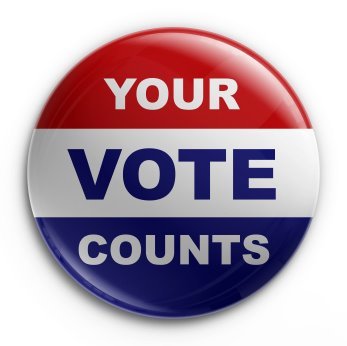The rich always vote for themselves. They go for their self-interest, their tax breaks, their liability escapes (think Wall Street). Meanwhile, they’ve relentlessly instructed the non-rich that they too must vote for the rich.
They’ve promised for decades that if the 99 percent just comply with the wishes of the wealthy, bow down, kiss their feet, shine their shoes, then some paltry portion of the bucket-loads of dough that the rich are amassing will dribble down upon the 99 percent.
That trickle-down trick didn’t work for the vast majority of Americans. The rich got richer, all right. But the rest slid backwards. Now income inequality is worse than it was during the era of robber barons. It’s time to turn that around. Political leaders must focus on the needs of the 99 percent. For that to happen, the 99 percent must vote for themselves on Tuesday. They must go for their self-interest, their wages, their health insurance, their Social Security.
Vote for higher wages for the 99 percent.
Minimum wage workers in the United States are paid so little that taxpayers subsidize the likes of Walmart and Wendy’s through government programs such as food stamps and Medicaid. That doesn’t happen everywhere.
As the New York Times pointed out last week, McDonald’s, Burger King and Starbucks all pay their workers in Denmark at least $20 an hour and provide paid vacations and pensions. And the companies still make profits.
The one percenter CEOs of these companies, who demand millions in pay for themselves, have squashed efforts to raise the U.S minimum wage, a pittance stuck five years at $7.25. Instead of improving paychecks, McDonald’s told its workers to get second jobs, forego heat in their homes and find health insurance for $20 a month.
When the minimum wage rises, it bumps up pay for everyone else. The 99 percent benefit. And the majority supports lifting the wage.
Voting for raises means voting for Democrats. President Obama has called for an increase, and U.S. Labor Secretary Tom Perez said the U.S. minimum wage is an international embarrassment. “I mean, we suck. We really do,” he said.
Republicans have consistently blocked a raise. New Jersey’s GOP Gov. Chris Christie, the nation’s fourth highest paid governor at $175,000 a year, said last month that he is “tired of hearing about the minimum wage.”
Vote for health insurance for the 99 percent.
The majority of Americans believe that health insurance should be accessible to everyone. The Affordable Care Act moved the nation closer to that, enabling tens of millions to get covered.
It prevented insurers from dumping clients when they get sick and from denying coverage to those with pre-existing conditions, like diabetes. It covered millions of young people to age 26 on their parents’ plans. It protected millions with an expansion of Medicaid.
National surveys have shown that low-income Americans are obtaining health insurance at a faster rate than the rich. There are two reasons for this. The rich already were covered. And the law was designed to help the working poor. This is creating fairness in access to medical care.
Republicans hate the law. Two dozen GOP governors refused to expand Medicaid in their states, and those places now suffer from the highest rate of uninsured residents. Republicans are so intent on denying health care to the working poor that they rejected a program that would cost them nothing for three years.
Now, Mitch McConnell, the Republican minority leader in the Senate, has again pledged to repeal the Affordable Care Act if the GOP takes control of his chamber. Republicans want to regress to higher inequality in health insurance coverage.
Vote to preserve and expand Social Security and Medicare.
These programs are not priorities of the rich. The wealthy are riding high on golden parachutes, gilded pensions, tax-sheltered off-shore accounts, and the built-in security of immense salaries. Social Security wouldn’t pay their country club fees.
For the rest, however, Social Security and Medicare mean fear relief. They’re crucial to the 99 percent.
For years now, however, Republicans have tried to privatize, cut and destroy these programs. U.S. Rep. Paul Ryan, the ranking Republican on the House Budget Committee, repeatedly has issued a “roadmap” for an America in which the rich drive new Ferraris bought with tax breaks and the rest forfeit their wheels because of cuts to Social Security, Medicaid and Medicare.
The overwhelming majority of Americans oppose cuts. Among Democrats, there’s a movement to increase benefits by lifting the $117,000 cap, after which income no longer is taxed for Social Security. The cap means that the rich pay proportionately less into Social Security than the rest.
Vote for the overwhelming majority, the non-rich, to get their needs met.
The nation’s richest are more politically engaged and get easier access to high-level politicians than the 99 percent. That isn’t just obvious. It’s also according to surveys and interviews of one-percenters conducted by three university professors. They are Northwestern University’s Benjamin I. Page and Jason Seawright and Vanderbilt’s Larry M. Bartels. Their report is called Democracy and the Policy Preferences of Wealthy Americans.
The rich minority gets its way. Bartels and another researcher showed in earlier studies that federal government policy corresponds much more closely with the wishes of the rich than the needs of the rest.
Bartels, author of Unequal Democracy: The Political Economy of the New Gilded Age, has noted that no other rich country came close to the United States in cutting the budget based on class preferences. It went this way: the workers lost programs; the wealthy kept perks.
This has got to change. And it could. In states with low voter turnout inequality – that is balloting by the non-rich more closely matching participation rates by the wealthy – there are higher minimum wages, stricter anti-predatory lending laws and better health benefits for the working poor. In other words, when workers vote, they’re more likely to get what they want from politicians.
Vote for yourself on Tuesday.

